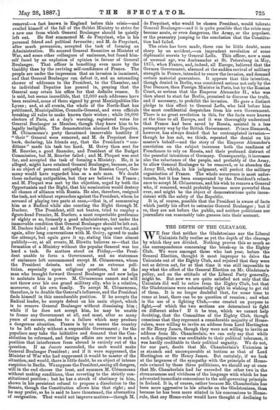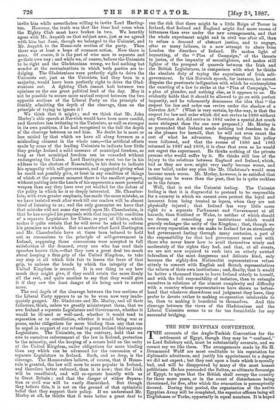THE DEPTH OF THE CLEAVAGE.
WE fear that neither the Gladstonians nor the Liberal Unionists fully realise as yet the depth of the cleavage
by which they are divided. Nothing proves this so much as the correspondence concerning the break-up in the Eighty Club. We were amongst those who last year, before the General Election, thought it most improper to drive the Unionists out of the Eighty Club, and rejoiced that they were not so driven out, for at that time it was still impossible to say what the effect of the General Election on Mr. Gladstone's policy, and on the attitude of the Liberal Party generally, might be. But now we are quite satisfied not only that the Unionists did well to retire from the Eighty Club, but that the Gladstonians were substantially right in wishing to get rid of them. It is no longer doubtful that, for some time to come at least, there can be no question of reunion ; and what is the use of a fighting Club,—one created on purpose to fight,—of which the two sections are determined to fight on different sides / If it be true, which we cannot help doubting, that the Committee of the Eighty Club, though conscious that they represent a considerable majority of Home- rulers, were willing to invite an address from Lord Harlington or Sir Henry James, though they were not willing to invite an address from Mr. Chamberlain, we can only say that while such a disposition was creditable to their political tolerance, it was hardly creditable to their political sagacity. We do not, for our part, doubt that Mr. Chamberlain's Unionism is as staunch and unconquerable at bottom as that of Lord Hartington or Sir Henry James. But certainly, if we look at the largeness of the sympathy with the principle of Home- rale evinced by these three politicians, we should say at once
that Mr. Chamberlain had far exceeded the other two in the strenuousness and vividness of the language with which he has
advocated immediate concessions to the self-governing principle in Ireland. It is, of course, rather because Mr. Chamberlain has been more aggressive in his attacks on the Gladstonians, than because he has been more stinted in his concessions to Home- rule, that any Home-ruler would have thought of declining to
invite him while nevertheless willing to invite Lord Harting- ton. However, the truth was that the time had come when the Eighty Club must have broken in two. We heartily agree with Mr. Asquith on that subject now, just as we agreed with him last June, though we belonged to the Unionist, and Mr. Asquith to the Home-rule section of the party. Then there was at least a hope of common action. Now there is none. Of course, it is the part of wise men to separate and go their own way ; and while we, of course, believe the Unionists to be right and the Gladutoniana wrong, we feel nothing but wonder at the recriminations in which both parties are in- dulging. The Gladatonians were perfectly right to drive the Unionists out, just as the Unionists, had they been in a majority, would have been perfectly right to drive the Glad- stonians out. A fighting Club cannot halt between two opinions on the one great political fend of the day. May it not be possible to secure more mutual respect between the two opposite sections of the Liberal Party on the principle of frankly admitting the depth of the cleavage, than on the principle of trying to ignore it ? We think that it might ; and we think that Mr. John Morley's able speech at Norwich would have been more candid, and therefore less irritating to the Unionists, as well as stronger in its own positions, if he had recognised to the full the depth of the cleavage between us and him. No doubt he is more or less misled by that which we have all along foreseen as a misleading clement in the whole case,—the artificial efforts made by some of the leading Unionists to indicate how little they grudge Ireland a solid measure of municipal freedom, so long as that municipal freedom can be conceded without endangering the Union. Lord Hartington went too far in his address to the electors of Rossendale, in his desire to indicate his sympathy with self-government, and suggested giving what he could not possibly give, at least in any condition of things of which at the present moment there is the smallest prospect, without putting into the hands of his opponents a more powerful weapon than any they have ever yet wielded for the defeat of the policy in which he is so deeply interested. Mr. Chamber- lain, with even greater emphasis, has made the same mistake, as we have insisted week after week till our readers will be almost tired of listening to us ; and the only guarantee we have that that mistake will not some day recoil upon Mr. Chamberlain, is that he has coupled his proposals with that impossible condition of a separate Legislature for Ulster, or part of Ulster, which makes it quite certain that he will never be asked to redeem his promises as a whole. But no matter what Lord Hartington and Mr. Chamberlain have at times been induced to hold out as concessions to the principle of self-government in Ireland, supposing those concessions were accepted in full satisfaction of the demand, every one who has read their speeches knows this,—that they care a great deal too much about keeping a firm grip of the United Kingdom, to take any step at all which bids fair to lessen the force of that grip, to unloose the bonds by which the integrity of the United Kingdom is secured. It is one thing to say how much they might give, if they could retain the more firmly all the rest, and quite another to say that they would give it if they saw the least danger of its being used to extort more.
The real depth of the cleavage between the two sections of the Liberal Party appears to us to be even now very inade- quately gauged. Mr. Gladstone and Mr. Morley, and all their followers, think, unless we greatly misinterpret them, that we owe Ireland a separate Legislature and Government, whether it would be ill-used or well-used, whether it would tend to separation or to conciliation, whether it would bring war or peace, under obligations far more binding than any that can be urged in support of our refusal to grant Ireland that separate Legislature. The Unionists, on the contrary, hold that we owe to ourselves enforcement of the law in Ireland, protection to the minority, and the keeping of a secure hold on the unity of the United Kingdom, under obligations far more binding than any which can be advanced for the concession of a separate Legislature to Ireland. Such, and so deep, is the cleavage. The Home-rulers believe, of course, that if Home- rule is granted, the law will soon be more popular in Ireland, and therefore better enforced, than it is now; that the Irish will be conciliated, and will co-operate heartily with us in Great Britain ; and that the danger of either Separa- tion or civil war will be vastly diminished. But though they believe this, it is not on the ground of that optimistic belief that they support their policy. If we understand Mr. Morley at all, he thinks that it were better a great deal to ran the risk that there might be a little Reign of Terror in Ireland, that Ireland and England might find more causes of bitterness than ever under the new arrangements, and that the whole experiment might end in civil war after all, than to refuse a demand of abstract justice, and to engage, after so many failures, in a new attempt to abate from London the disorders of Ireland. He makes light of boycotting, of the " Plan of Campaign," of the threats to juries, of the impunity of moonlighters, and makes still lighter of the prospect of quarrels between the Irish and the British Legislatures, in comparison with what he thinks the absolute duty of trying the experiment of Irish self- government. In this Norwich speech, for instance, he cannot disguise the passionate indignation with which he contemplates the enacting of a law to strike at the "Plan of Campaign,"— a plan of plunder, and nothing else, as it appears to us. He evidently holds that it should be allowed to go on with perfect impunity, and he vehemently denounces the idea that " the respect for law and order can revive under the shadow of a Coercion Act." (What is very certain, by-the-way, is that the respect for law and order which did not revive in 1880 without any Coercion Act, did revive in 1882 under a special Act much more stringent than the one now proposed.) Mr. Morley is so persuaded that Ireland needs nothing but freedom to do as she pleases for herself, that he will not even count the cost of what he advocates. Supposing that his policy were followed, and that the scenes of 1880 and 1881 returned in 1837 and 1888, it is clear that even so he would not regret the experiment. He thinks nothing of the private persona who would suffer by it. He thinks still less of the injury to the relations between England and Ireland, which, bad as they are now, might very easily become worse, and in our belief, under any plan like Mr. Gladstone's would soon become much worse. Mr. Morley, however, is so satisfied that nothing can be worse than the past, that he is quite reckless as to the future.
Well, that is not the Unionist feeling. The Unionist feeling is that it is disgraceful to pretend to be responsible for a country in which we cannot even protect the loyal and innocent from being treated as lepers, when they are not physically injured ; that Ireland has very little more right to a separate Parliament and Government at all hazards, than Scotland or Wales, to neither of which should we dream of conceding any institutions which would gravely endanger the unity of the Kingdom ; that, though we owe every reparation we can make to Ireland for an atrociously bad government lasting through many centuries, a part of the responsibility for that bad government must rest with those who never knew how to avail themselves wisely and moderately of the rights they had, and that, at all events, we are not now required to rush into an utterly untried federalism of the most dangerous and delicate kind, only because the eighty-five Nationalist representatives refuse utterly to concert with English and Scotch representatives the reform of their own institutions ; and, finally, that it would be better a thousand times to leave Ireland utterly to herself, and with the full responsibility of isolation, than to entangle ourselves in relations of the utmost complexity and difficulty with a country whose representatives have shown us before- hand that whatever shrewdness and judgment they have, they prefer to devote rather to making co-operation intolerable to us, than to making it beneficial to themselves. And this cleavage between the views of the Gladstoniana and the Liberal Unionists seems to us far too formidable for any successful bridging.



































 Previous page
Previous page